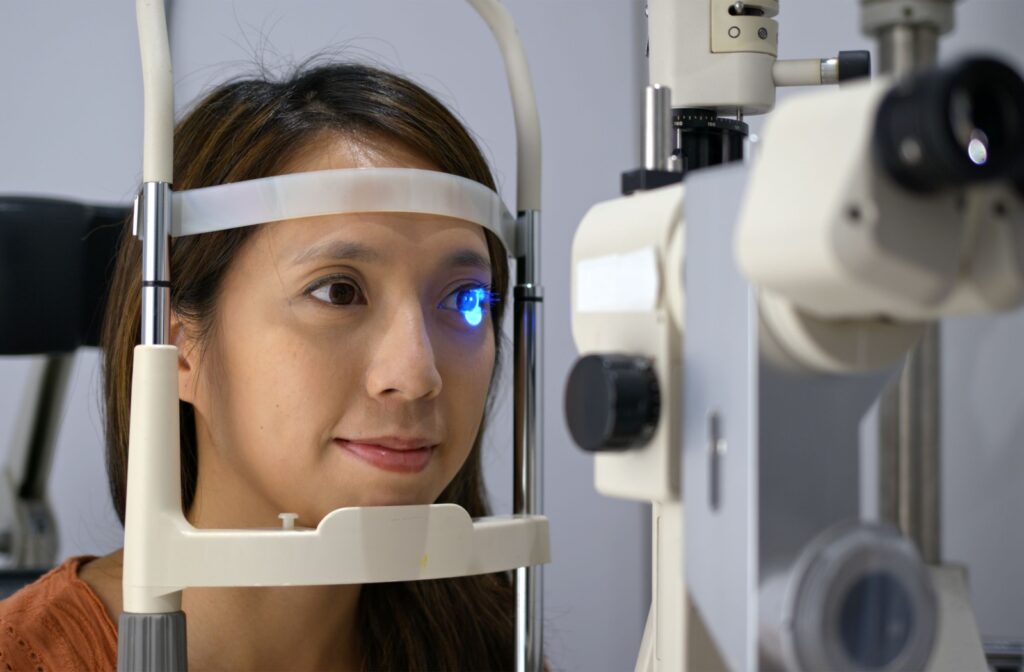Accommodative insufficiency is an eye condition that makes it difficult for your eyes to focus on close-up objects, often causing blurred vision, headaches, and eye strain. It can affect anyone but is most commonly noticed in children and young adults.
When your eyes are healthy, they can easily shift focus from distant to near objects. This is possible because of a process called accommodation, which involves the lens in your eye adjusting to bring nearby objects into clear focus. When this focusing system is not working properly, it can lead to discomfort and difficulty with daily tasks, especially those that require sustained near vision, like reading or using digital devices.
Understanding the symptoms, causes, and treatment options, such as vision therapy, for accommodative insufficiency can help you manage this condition and maintain clear, comfortable vision.
What Does Accommodation Mean?
Accommodation is the eye’s ability to change focus between objects at different distances. When you look at something up close, the ciliary muscle in your eye contracts, causing the lens to thicken and bring the object into clear focus.
This process happens automatically and quickly. However, if your focusing system is weak or not functioning correctly, your eyes may struggle to maintain this focus when viewing nearby objects.
What Are the Symptoms of Accommodative Insufficiency?
Accommodative insufficiency is a type of accommodative dysfunction, a broader category of focusing problems that affect the eye’s ability to adjust between near and distant objects.
People with accommodative insufficiency often experience symptoms when performing tasks that require sustained near vision. These symptoms can vary in severity but typically include:
- Blurred vision when reading or looking at close objects
- Difficulty switching focus between near and far objects
- Eye strain or discomfort after prolonged near work
- Headaches, especially after reading or screen use
- Fatigue or tired eyes during visual tasks
- Double vision in some cases
- Reduced concentration while reading
Children with accommodative insufficiency may avoid reading, have difficulty keeping up with schoolwork, or complain about headaches and tired eyes.
What Causes Accommodative Insufficiency?
Several factors can contribute to accommodative insufficiency. Some individuals may develop it without a clear cause, while others may experience focusing issues due to specific triggers.
Common causes include:
- Age: While this condition is more common in children and young adults, focusing ability naturally declines with age, leading to presbyopia after age 40.
- Visual fatigue: Extended periods of reading, screen time, or other close work can strain the focusing system, leading to temporary or long-term focusing difficulties.
- Uncorrected vision problems: Refractive errors like farsightedness (hyperopia) require extra focusing effort, increasing strain on the eyes.
- Medications: Certain medications, such as antihistamines, antidepressants, and stimulants, can affect focusing ability.
- Illness: Viral infections or general fatigue can temporarily reduce the eyes’ focusing strength.
How Is Accommodative Insufficiency Diagnosed?
If you are experiencing symptoms of accommodative insufficiency, a comprehensive eye exam can help diagnose the issue. Eye care professionals use specific tests to evaluate your focusing ability and overall visual function.
Specific tests may be performed to diagnose your issue, such as:
- Visual acuity test: Measures how well you see at various distances.
- Refraction test: Determines whether you need glasses to correct vision errors.
- Accommodation test: Assesses your eye’s ability to focus on close-up objects.
- Near point of convergence test: Evaluates how well your eyes work together when focusing on a nearby object.
These tests allow your eye doctor to determine whether accommodative insufficiency is the cause of your symptoms or if another condition, such as convergence insufficiency, is contributing to your discomfort.
Common Treatment Options
Fortunately, accommodative insufficiency is treatable. The goal of treatment is to reduce symptoms and improve your eye’s ability to maintain focus during near tasks.
Prescription Glasses
Glasses with single-vision lenses or reading lenses can reduce strain on your focusing system during near work. This is often the first step in relieving symptoms, especially for children and those with uncorrected vision problems.
Vision Therapy
Vision therapy is a personalized program of eye exercises designed to strengthen your focusing muscles and improve your eye coordination.
- Typically recommended for individuals whose symptoms persist despite wearing glasses.
- It involves in-office and at-home exercises to enhance focusing efficiency over time.
Lifestyle Adjustments
While it may not always be preventable, certain habits can help support healthy focusing function. Making small changes to your daily routine can further ease strain on your eyes:
- Follow the 20-20-20 rule: Every 20 minutes, look at something 20 feet away for 20 seconds.
- Reduce screen time: Take breaks when using digital devices for extended periods.
- Improve lighting: Ensure your reading and work areas are well-lit.
- Practice good posture: Sit at a comfortable distance from your work or screen.

Frequently Asked Questions About Accommodative Insufficiency
How Long Does It Take to See Improvement?
The timeline for improvement varies depending on the severity of the condition and the treatment method.
- Glasses: Relief is often felt within days or weeks.
- Vision therapy: Noticeable improvement may take several weeks to a few months, depending on consistency and the individual’s response.
Following your eye doctor’s guidance and being consistent with any recommended therapy is crucial for long-term success.
What Happens If Accommodative Insufficiency is Untreated?
If accommodative insufficiency is not managed, it can interfere with daily activities, especially for students and individuals whose jobs involve a lot of reading or computer work.
- Children may struggle academically or avoid reading altogether.
- Adults may experience ongoing discomfort, reduced productivity, and increased fatigue.
Addressing the condition early can improve visual comfort and performance in both work and school environments.
Protect Your Vision With Total Vision
Accommodative insufficiency can disrupt your daily routine and cause unnecessary discomfort, but with proper diagnosis and treatment, clear and comfortable vision is achievable.
Recognizing the signs early and seeking professional eye care can help prevent long-term issues and improve your quality of life. Regular eye exams for both adults and children are essential to detect focusing difficulties and other vision conditions before they interfere with your everyday tasks.
Schedule an appointment with Total Vision Campbell today to find the right treatment plan and achieve lasting relief.



